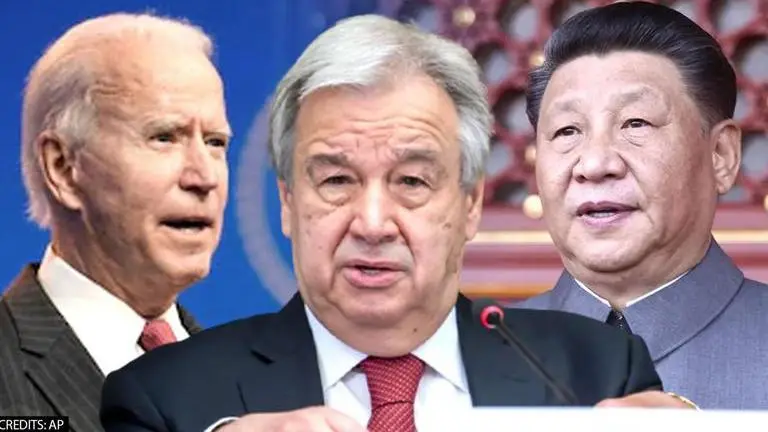Updated 20 September 2021 at 20:50 IST
UN chief warns US, China against 'new Cold War,' calls bilateral ties 'dysfunctional'
UN Secretary-General Antonio Guterres has warned of a new potential cold war between the United States & China and called the bilateral ties 'dysfunctional.'
- World News
- 4 min read

The United Nations (UN) Secretary-General Antonio Guterres has warned of a new potential cold war between the United States and China. He also implored two of the world’s superpowers to repair their “completely dysfunctional” relationship. While speaking with The Associated Press before this week’s annual UN gathering of world leaders, the UN chief said that both Washington and Beijing should be cooperating on global issues such as climate and negotiate more robustly on trade and technology. According to Guterres, the world’s major powers should indulge in giving persisting political fissures about human rights, online security and sovereignty in the South China Sea.
Guterres said, “Unfortunately, today we only have confrontation.”
“We need to re-establish a functional relationship between the two powers,” he said, adding that it is “essential to address the problems of vaccination, the problems of climate change and many other global challenges that cannot be solved without constructive relations within the international community and mainly among the superpowers.”
US-China relations can divide the world: Guterres
Guterres remarks in a Saturday interview with AP came two years after he warned the global leaders of the risk of the world splitting in two. At the time, the UN chief had noted that the United States and China were creating rival interests, currency, trade, financial rules“ and their own zero-sum geopolitical and military strategies.” Reiterating the same concerns on September 18, Guterres said that two rival geopolitical and military strategies would pose “dangers” and divide the world. Hence, he called for the rectification of bilateral ties.
“We need to avoid at all cost a Cold War that would be different from the past one, and probably more dangerous and more difficult to manage,” Guterres said.
‘Cold War’ between the Soviet Union and its East-bloc allies and the United States and Western allies began right after World War II. The so-called war finally ended with the split of the Soviet Union in 1991. Millions of dollars were spent in the clash of two nuclear-armed superpowers with antagonistic ideologies. There was communism and authoritarianism on one side while capitalism and democracy were on the other side.
Why is Cold War 'more perilous'?
UN chief said that a new Cold War could be 'more perilous' this time because the Soviet-US antipathy created evident rules. He also said that both sides were careful of nuclear destruction which created back channels and forums “to guarantee that things would not get out of control.” He added, “Now, today, everything is more fluid, and even the experience that existed in the past to manage crisis is no longer there.”
Advertisement
Guterres on AUKUS
Weighing in on the US, UK and Australia’s defence strategic pact AUKUS, UN chief said that US-Britain deciding to provide Australia with nuclear-powered submarines for undetected operations in Asia “is just one small piece of a more complex puzzle ... this completely dysfunctional relationship between China and the United States.” Reportedly, the secretly negotiated deal between the three nations left China and France furious. Paris had signed a contract with Canberra worth around $66 billion for a dozen French conventional diesel-electric submarines.
Guterres on UN’s role in Afghanistan
As per AP, when Guterres was asked about the United Nations’ role in dealing with the crisis unfolding in Afghanistan since the Taliban took over on August 15, the UN chief said it would be a “fantasy” to believe that UN intervention “will be able all of a sudden to produce an inclusive government, to guarantee that all human rights are respected, to guarantee that no terrorists will ever exist in Afghanistan, that drug trafficking will stop.”
Advertisement
However, he noted that even though the UN has “limited capacity and limited leverage,” the peace-making body is playing a significant role in leading the measures of providing Afghans with crucial humanitarian aid. He told AP that the UN is drawing the Taliban’s attention to the importance of an inclusive government that safeguards human rights and especially women.
Reasoning why the international community should engage with the Taliban, he said, “There is clearly a fight for power within different groups in the Taliban leadership. The situation is not yet clarified.”
IMAGE: AP
(With AP inputs)
Published By : Aanchal Nigam
Published On: 20 September 2021 at 20:50 IST
